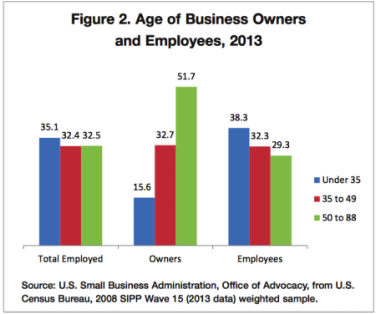
Small businesses are the engine of our economy. And, Baby Boomers (born between 1946-1964) are in the driver's seat. Unfortunately, most of these owners do not know what will happen to their specific businesses as they near retirement.
What will happen to our economy as a result?
Consider the facts:
The back-bone of our economy, the data suggest, are small businesses. Yet, danger for these critical companies looms. U.S. Trust recently released a study identifying a frightening statistic--nearly two-thirds of business owners lack a transition plan.
Considering that 50% are owned by a group of people approaching a retirement age presents a considerable conundrum--What will happen when the Boomers actually do retire? What will happen to the jobs these companies create? What will happen to the families the business feeds, the communities the business supports?
While answers for each case is unclear, the charge to business owners is fairly simple--Business owners should start planning now. And, if an owner doesn't know where to start, here are 3 quick tips:
The problem is real but so are available solutions. Let's work hard toward an orderly transition for our economy. Our country deserves it.
*http://www.sbecouncil.org/about-us/facts-and-data/
What will happen to our economy as a result?
Consider the facts:
- Small businesses produce almost half of the non-farm private GDP in the US.(*source)
- Firms with less than 100 employees account for 34.5% of US employment.(*source)
- Over 50% of all domestic business owners are 50 years of age or older. (See graph above)
The back-bone of our economy, the data suggest, are small businesses. Yet, danger for these critical companies looms. U.S. Trust recently released a study identifying a frightening statistic--nearly two-thirds of business owners lack a transition plan.
Considering that 50% are owned by a group of people approaching a retirement age presents a considerable conundrum--What will happen when the Boomers actually do retire? What will happen to the jobs these companies create? What will happen to the families the business feeds, the communities the business supports?
While answers for each case is unclear, the charge to business owners is fairly simple--Business owners should start planning now. And, if an owner doesn't know where to start, here are 3 quick tips:
- Identify strong advisers (a CPA and an Attorney are great places to start). Get references from friends if you don't know where to start. Interview these advisers for a sense of trustworthiness and competence.
- Unless it's an urgent situation, resist the pressure to figure out the mechanics on day 1; instead, consider your personal and professional strategic goals. Then, let your strategy drive your tactics.
- Manage your business well. Keep good records. File your taxes. Train your employees. Decentralize your customer base. Pay down debt. Start letting others in the company take on more responsibility so that when you, as the Owner, decide to go, customers won't leave. In other words, manage your business well.
The problem is real but so are available solutions. Let's work hard toward an orderly transition for our economy. Our country deserves it.
*http://www.sbecouncil.org/about-us/facts-and-data/


 RSS Feed
RSS Feed